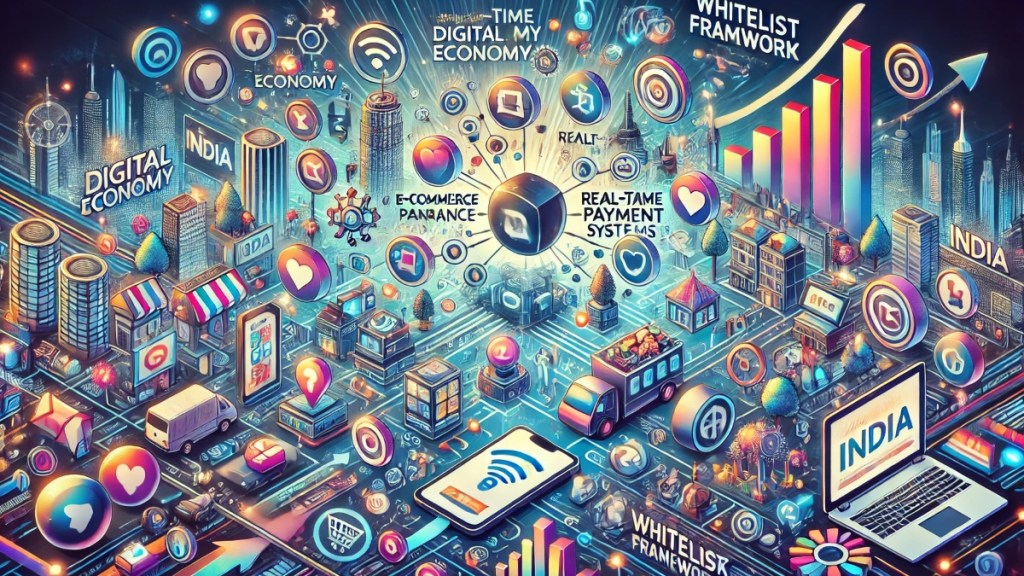By AK Pandey
In the last decade, India’s internet economy has exploded on the shoulders of the JAM trinity. Digital democratisation, powered by near-universal access to banking, has created a massive market for digital services. With over 900 million smartphone internet connections, the Indian digital ecosystem has shifted drastically from being an exporter of software and skilled labour to becoming the world’s largest real-time payment market.
India’s booming digital economy
Between 2017 and 2023, retail digital payments surged 50.8 percent. Today, our digital ecosystem is pegged to be the fastest-growing market in the world. It accounted for 4.5 percent of India’s GDP in 2014 and is expected to contribute 20 percent of the GDP by 2026.
Life has certainly changed for the average Indian. The internet economy has unleashed access and convenience like never before. Sectors like e-commerce, health, insurance, and investment have undergone large-scale digital transformation, creating lakhs of opportunities for budding entrepreneurs. Perhaps that’s why it’s no surprise that several unicorns have become essential partners in our day-to-day lives.
While there are several contributors to this mega propulsion, amongst them is the gaming sector. Home to more than 45 crore gamers, including 0.18 crore e-sports players (PWC), Indian online gaming is estimated to reach INR 66,000 crore, growing at a CAGR of 14.5% between 2023–2028.
Whitelist Framework
In the gaming sector, a reasonable approach to tackling this menace could be by creating a ‘Whitelist’ framework. A ‘Whitelist’ in simple terms, is a mechanism to differentiate the legitimate from the illegitimate businesses or apps. This could work equally well for all sectors of the digital economy be it fintech, gaming, crypto, OTT or social media.
Differentiating legitimate apps from illegitimate ones might seem like a regulatory puzzle, but it could be simplified by four easy-to-answer questions. To put checks and balances in place, the government must know—
1. Is the company registered in India, with India-based offices?
2. Is the company registered to pay taxes (GST) in India?
3. Does the company self-declare to follow applicable laws on taxes, grievance redressal, advertising, and product/service quality concerning their sector?
4. Businesses that tick the above boxes may be presumed to be operating in good faith and could earn a ‘symbol of trust’ which would help separate the wheat from the chaff.
Offline Whitelist Framework
Cyberspace and therefore the crimes committed in it, thrive on anonymity with nameless, faceless entities. By creating a ‘symbol of trust,’ a consumer can differentiate between a legitimate business offering lawful and good quality products and services from the illegitimate fly-by-night operators. An offline example of such a symbol of trust is the ‘ISI’ mark – which became a standard quality and compliance mark for products since 1950. On one hand, it helped consumers identify and buy quality products, and on the other, it set a benchmark for manufacturers who wanted to do business in the market.
The digital ecosystem needs similar symbols of trust to assure consumers that the product is legal, authentic and compliant with the digital laws of India. The onus of this trust-building measure should not solely lie on the shoulders of businesses. Not all businesses may see the need for it, and more importantly, consumers may not trust a ‘symbol of trust’ that private businesses create. Therefore, to stay ahead of the ever-shifting digital curve requires a concerted and coordinated effort between industry, government and society.
The end goal is the same for everyone: to create guardrails so consumers and industry can be protected from fly-by-night operators. This is now mission-critical in our national goal of having a trillion-dollar digital economy.
The author is Former Joint Advisor, TRAI.
Disclaimer: Views expressed are personal and do not reflect the official position or policy of FinancialExpress.com. Reproducing this content without permission is prohibited.


